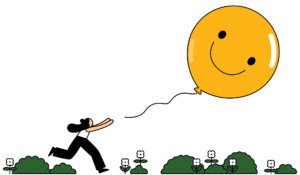
Being cheerful, smiling all the time, seeing the glass always half full… Aren’t these overwhelming you too? Sometimes we can be unhappy. We may have started the day unhappy, sluggish, reluctant. Pretending to be cheerful in these situations is dangerous because it prevents us from experiencing the emotions we really feel. It is normal to experience unhappiness and sadness. Living without suppressing these feelings will contribute to your happiness tomorrow.
Many of us are “Cheer up” by our well-meaning friends or family. or “Look on the bright side.” Suggestions are coming. This is because they see us as sad, angry, worried, or frustrated. But at the same time, we can be exposed to these suggestions because we seem distracted and indecisive. In those cases, tell them “Shut up!” While we’re willing to say it, we usually can’t. Feel free to do this next time but please be polite
“Being positive has become a new form of moral integrity,” says psychologist Susan David , a Harvard psychology instructor and author of Emotional Agility. says.
Suppressing or moving away from our difficult emotions isn’t healthy or helpful, David says. “What happens is that this situation undermines our ability to deal with the world as it is, not as we want it to be.” says. And he adds: “It is associated with lower levels of resistance, lower levels of health, and higher levels of depression, anxiety. It also affects our relationships and our ability to achieve our goals.”
So what should we do instead?

“Instead of pushing aside sadness or forcing positivity, try to effectively label that difficult emotion. In my work, most of the time people just use black or white labels to describe how they’re feeling.” says David. “Stress” is one of the most common emotions. But there’s a world of difference between the stress of being genuinely overwhelmed or overwhelmed, the stress of being disappointed or knowing you’re in the wrong job, wrong relationship. Labeling our emotions more accurately helps us understand the cause of those emotions. It also allows you to realize what is called “readiness potential”. This “readiness potential” is the activation of your ability to set goals and make realistic changes to overcome this challenge.
David says, “When you manage to label your emotion, tenderly recognize the emotion. People often think that compassion is about being weak or lazy or lying to yourself.” says. “In fact, compassion allows you to create a safe space in which you can take more risks. You can explore the world and be more effective. Because if things don’t go your way, you know you’re going to love yourself anyway. You will still be kind to yourself. Compassion is associated with being more effective.”
Finally, David says: “Try to recognize what the emotional story is.” Act as an observer and create a gap between yourself and what you are feeling by naming all the dimensions or phases of that difficult thing you are going through. Instead of simply saying, “I’m sorry,” you can say something like, “I realize I’m feeling sad, I realize I’m undermined, I realize the urge to leave…”. This allows you to highlight other aspects of yourself, such as your values and intentions. Doing so also puts you in charge, rather than emotion. “More important is not whether you have negative thoughts or emotions, but whether you attach to them,” David says. says.














